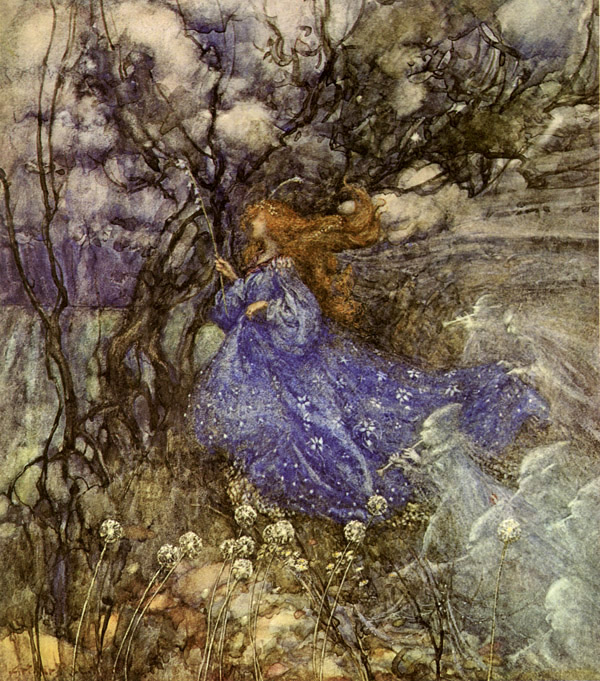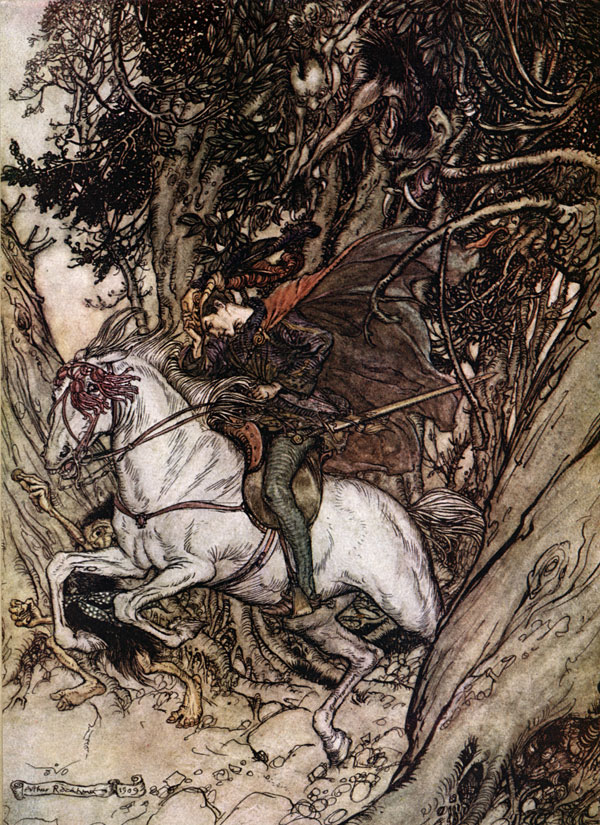king Gilardin (Re Giraldin) is a Piedmontese ballad of early medieval origin, collected and published in different versions by Costantino Nigra in his anthology “Canti popolari del Piemonte” (Popular songs of Piedmont).
The fairy’s present
Costantino Nigra also reports a fairy tale on the same theme as the ballad King Giraldin, listened to by the old peasant women of Castelnuovo.
“ There was a hunter who often hunted on the mountainside. Once he saw a very beautiful and richly dressed woman under a rock bottom. The woman, who was a fairy, nodded to the hunter to approach and asked him to take her as his wife. The hunter told her he was just married and did not want to leave his young bride. The fairy gives him a casket containing a gift for the young wife, and advises him to hand it out only to her and by no means to open it. Of course, on his way home he cannot refrain from opening it and finds a splendid belt interwoven with gold and silver threads. Just to know what it will look like when worn by his wife, he ties it round the trunk of a tree. Suddenly the belt catches fire when the tree is hit by a flash of lightning. The hunter is hit, too and he hardly manages to drag himself home. He crumbles on his bed and dies.“
In the Breton and Piedmontese version, the accent is placed more precisely on the second part of the story, where the death of the king is concealed from the betrothed.
A tipicall feature in all Romance languages of the ballad: Comte Arnau (in the Occitan version), Le Roi Renaud (the French one) and Re Gilardin (the Piedmontese one).
The relationship between the knight-king and the fairy-mermaid is more nuanced than the Nordic versions, it seems to prevail a more “catholic” and intransigent view on sexual relations … in fact in the ballad greenwood and fairy disappear while the knight returns from the war wounded to death.
KING GILARDIN
La Ciapa Rusa (founders Maurizio Martinotti and Beppe Greppi) made many ethnographic researches with the elderly singers and the players of the musical tradition of the Four provinces -to be precise in Alta Val Borbera – a mountain area straddling four different provinces Al, Ge, Pv and Pc.
The Ciapa Rusa in 1982 makes an initial arrangement of Re Gilardin, in this first version there is a sort of dramatic representation with the narrating voice, the king (Maurizio Martinotti), the mother, the widow, the altar boy. We can imagine all the most tragic and comical scenes – turned into horror with the dead man who snatches a last kiss from his widow!
they follow with a good skill the Piedmontese version and in the notes Gordon says he has received the Ciapa Rusa version through the Italian music journalist Mauro Quai
| RE GILARDIN* I Re Gilardin, lü ‘l va a la guera Lü el va a la guera a tirar di spada (Lü el va a la guera a tirar di spada) O quand ‘l’è stai mità la strada(1) Re Gilardin ‘l’è restai ferito. Re Gilardin ritorna indietro Dalla sua mamma vò ‘ndà a morire. II O tun tun tun, pica a la porta “O mamma mia che mi son morto”. “O pica pian caro ‘l mio figlio Che la to dona ‘l g’à ‘n picul fante(2)” “O madona la mia madona(3) Cosa vol dire ch’i sonan tanto?” “O nuretta, la mia nuretta I g’fan ‘legria al tuo fante” III “O madona la mia madona Cosa vol dire ch’i cantan tanto?” “O nuretta, la mia nuretta I g’fan ‘legria ai soldati “O madona , la mia madona Disem che moda ho da vestirmi” “Vestati di rosso, vestati di nero Che le brunette stanno più bene” IV O quand l’è stai ‘nt l üs de la chiesa D’un cirighello si l’à incontrato “Bundì bongiur an vui vedovella” “O no no no che non son vedovella g’l fante in cüna e ‘l marito in guera” “O si si si che voi sei vedovella Vostro marì l’è tri dì che ‘l fa terra” V “O tera o tera apriti ‘n quatro Volio vedere il mio cuor reale” “La tua boca la sa di rose(4) ‘nvece la mia la sa di terra” | English translation** I King Gilardin was in the war, Was in the war wielding his sword. (Was in the war wielding his sword.) When he was Midway, upon the journey, King Gilardin was wounded. King Gilardin goes back home At his mother’s house he whished to die. II Bang, bang! He thumped at the door. “O Mother, I am near to die.” “Don’t thump so hard, my son, Your wife has just given birth to a boy.” “My Lady my mother-in-law What does all their chanting mean?” “O my daughter-in-law, They want to feast your baby.” III “My Lady my mother-in-law What does all their singing mean?” “O my daughter-in-law, They want to entertain the soldiers.” “My Lady my mother-in-law Tell me, how shall I dress?” “Dress in red or dress in black, It fits brunettes perfectly .” IV When she came to the church gate, She encountered an altar boy: “A wish you a good day, new widow.” “By no means am I a new widow, I’ve a child in its cradle and a husband at war.” “O yes, you are a new widow, Your husband was buried three days ago.” V “O earth, open up in four corners! I want to see the king of my heart.” “Your mouth has a taste of rose, Whereas mine has a taste of earth.” |
NOTES
* (From an original recording by Maurizio Martinotti in the upper Val Borbera)
** (revised by here)
1) it’s inevitable remembering Dante “Midway, upon the journey of our life” (with forest corollary), in this context it’s a point that changes forever the life of the king, or the hero.
2) probably he knew about his fatherhood at the time of his death
3) in the answers the real reason for the preparations is hidden: the king’s funeral is being set up
4) it is the dead king who speaks to his wife, but also the popular wisdom, the tearful burial times are still to come .. In the French (and Occitan) version of Re Renaud the earth opens up to swallow up the lady
Maurizio Martinotti has again re-released Re Giraldin in Medley with Lo Compte Arnaud recorded by the supergroup Dòna Bèla (voices by Renat Sette and Maurizio Martinotti) 2014 – for the Provençal version
RE ARDUIN
Cantovivo recorded the same ballad with the title “King Arduin” already collected from the oral tradition by Franco Lucà, in 1984 to Alpette Canavese, performer Battista Goglio “Barba Teck” (1898-1985)
| RE ARDUIN I Re Arduin (1) a ven da Turin Re Arduin a ven da Turin Ven da la guera l’è stai ferì Ven da la guera l’è stai ferì II “O mamma mia preparmi ‘l let La cuerta noira e i linsöi di lin III O mamma mia cosa diran Le fije bele ca na stan lì” IV “O no no no parla en tan La nostra nora l’à avù n’infan” V “O mamma mia (2) disimi ‘n po’ Che i panatè a na piuren tan” VI “A l‘àn brüsà tüti i biciulan (3) L‘è par sulì c’a na piuren tan” VII “O mamma mia cosa diran Perché da morto na sunen tan” VIII “Sarà mort prinsi o quai signor Tüte le cioche a i fan unur” IX “Re Arduin a ven da Turin L‘è ndà a la guera l’è stai ferì” X “O tera freida apriti qui Ch io vada col mio marì” | English Translation Cattia Salto I King Arduin comes from Turin King Arduin comes from Turin comes from the war and he was wounded, comes from the war and he was wounded II O mother dear, prepare me my bed the black blanket and linen sheets III O mother dear what will they say the fine ladies who stay there? IV Do not talk a lot our daughter in law has had a baby V O mother dear tell me why the bakers so cry? VI They burned all their breads for they cry so much VII O mother dear what’s the news for stroking the funeral bells? VIII The prince or some Lord will be dead all the bells do him honor IX King Arduin comes from Turin comes from the war and he was wounded, X O earth, open up now that I’ll go with my husband |
NOTES
* from here
1) King Arduin (Marquis of Ivrea and first king of Italy) is still extremely popular in the Canavese, tributing him in many historical re-enactments
2) in reality it is the daughter-in-law who asks for information on the laments and the dead bells (theme of hidden death) while in the first part (verses II and III) it is Arduino who speaks. Only in the 9th stanza is the death of Arduino announced
3) the “bicciolani” are biscuits typical of Vercellese, but in Turin the biciulan are long and thin breads (a bit pot-bellied in the middle and thin at the tips) the Piedmontese version of the baguette!
Recent reworking by Andrea Capezzuoli and the Company
Concealed death
LORD OLAF AND THE ELVES
SCANDINAVIAN VARIANTS
BRITISH AND AMERICAN VERSIONS
FRENCH VERSIONS
ITALIAN VERSION
LINK
https://minimazione.wordpress.com/2007/08/22/re-gilardin-alla-guerra/
http://www.antiwarsongs.org/canzone.php?lang=it&id=1048
http://chrsouchon.free.fr/chants/italren.htm
http://www.nspeak.com/allende/comenius/bamepec/multimedia/saggio1.htm
http://www.traditionalmusic.co.uk/child-ballads-v2/child8-v2%20-%200371.htm
http://amischanteurs.org/wp-content/uploads/Canti-di-Donata-Pinti.pdf



Grazie per la segnalazione, errore corretto